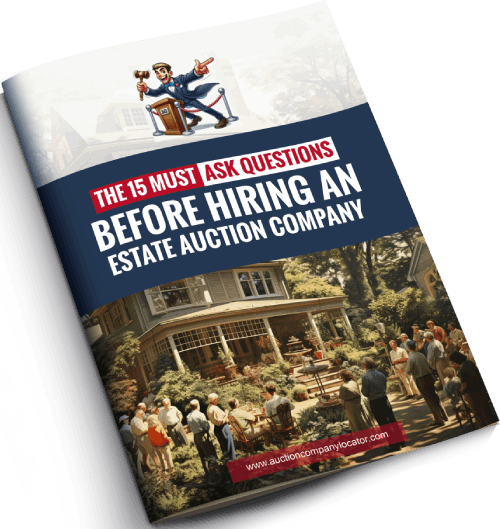
Welcome to our Estate Auction FAQ page, where we answer the most common questions we get about selling land at auction.
An estate auction is the sale of personal property from an estate, typically after the owner has passed away, moved into assisted living, or is downsizing.
Items from the estate are cataloged, appraised, and sold to the highest bidder in either an on-site, online, or hybrid auction format.
Estate auctions can include furniture, antiques, jewelry, artwork, vehicles, collectibles, real estate, and more.
If you have a large number of items to sell and want to sell them quickly, an auction can often yield competitive market prices.
An estate sale is typically a tag sale with fixed prices, while an estate auction allows for competitive bidding and the potential for higher sale prices.
An auctioneer or appraiser will assess the items based on market demand, condition, and rarity to determine an estimated value.
Auction companies typically charge a commission, ranging from 10% to 35%, depending on the total value of the estate and services provided.
The timeline can vary, but most auctions, from initial consultation to the auction itself, are completed within 4 to 8 weeks.
Yes, reserve prices can be set for high-value items to ensure they are not sold for less than a certain amount.
Unsold items can either be relisted in another auction, sold privately, or donated, depending on your preferences.

Ready to make an informed decision on your next auction? Download our essential “15 Must Ask Questions” guide for FREE! These quick guides arm you with the key questions to ask before hiring an estate, business liquidation, or land auction company. Simply enter your email to access expert tips that could save you time, money, and ensure you’re partnering with the best. Don’t leave your next auction to chance—download your guide now!
Items are listed with descriptions and photos, and bidders place bids online over a set period. The highest bidder at the close of the auction wins the item.
Estate auctions are quick, transparent, and competitive, often resulting in higher prices for valuable items. They also help clear out an entire estate efficiently.
Preparation includes organizing and cataloging items, cleaning them if necessary, and ensuring the estate is accessible for preview days or the auction event.
Minor cleaning or repairs can help increase an item’s value, but major renovations or repairs are typically unnecessary.
Look for an auction company with experience in estate auctions, strong marketing strategies, transparency in fees, and a solid track record of successful sales.
Auction companies use a mix of online listings, social media, email blasts, print ads, and direct marketing to reach potential buyers.
Whether online or in person, the auctioneer will introduce items, bidders will place bids, and the highest bidder wins each item. Payment and item collection are handled post-auction.
Payment is typically issued within 7 to 14 days after the auction, once the buyers have paid and all transactions are finalized.
Depending on local tax laws, capital gains taxes may apply to the sale of certain items. It’s best to consult with a tax professional for specific advice.
Choosing a reputable auctioneer with a broad network and effective marketing strategy is key to drawing in bidders for a successful auction.
Fill out the form below, and we will send your copy of:
“15 Must Ask Questions Guide” for your auction type.